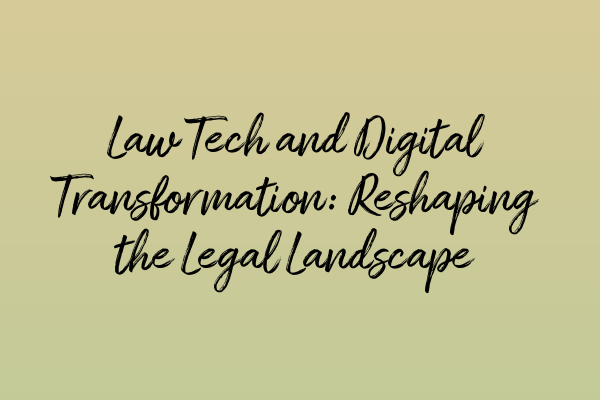Law Tech and Digital Transformation: Reshaping the Legal Landscape
In today’s digital age, every industry is being transformed by technology, and the legal sector is no exception. Law tech and digital transformation are revolutionizing the way legal professionals work, improving efficiency, enhancing client service, and reshaping the legal landscape as we know it. In this blog post, we will explore the key aspects of law tech and digital transformation and discuss their impact on the legal profession.
The Digital Transformation of Legal Services
The digital transformation of legal services refers to the integration of technology into various aspects of the legal industry, including case management, document management, legal research, and communication. By leveraging technology, legal professionals can streamline their workflow, automate repetitive tasks, and access information more efficiently.
One area where technology has had a significant impact is in case management. Gone are the days of sifting through piles of paperwork and manually tracking case progress. With digital case management systems, solicitors can now organize and manage their cases electronically, ensuring all relevant documents are easily accessible and securely stored.
Another key aspect of digital transformation in the legal sector is the use of technology in legal research. With online platforms and databases, solicitors can now conduct faster and more comprehensive research, accessing a vast amount of legal information at their fingertips. This not only saves time but also enables legal professionals to provide more accurate and up-to-date advice to their clients.
The Rise of Artificial Intelligence in Law
Artificial Intelligence (AI) has emerged as a game-changer in the legal industry. AI-powered applications can perform tasks that were previously handled by human lawyers, such as contract analysis, legal research, and due diligence.
Contract analysis, for example, can be a time-consuming and tedious task for solicitors. AI-based contract review software can automate this process, analyzing contracts for key clauses, highlighting potential risks, and reducing the time spent on manual review. This not only improves efficiency but also minimizes the chances of human error.
Legal research, too, has been revolutionized by AI. Advanced algorithms can now analyze vast amounts of legal data, identifying patterns and providing insights that would have taken human researchers weeks or even months to uncover. This allows for more thorough and effective legal research, enabling solicitors to build stronger cases and provide more tailored advice to their clients.
Enhanced Client Service through Technology
Law tech and digital transformation have not only improved efficiency within the legal profession but have also enhanced client service. Technology allows solicitors to provide their clients with real-time updates, access to case documents, and a more personalized experience.
For example, online client portals enable solicitors to securely share case updates, documents, and communication with their clients. This eliminates the need for constant back-and-forth email exchanges, providing clients with instant access to relevant case information and fostering transparent and collaborative relationships between solicitors and their clients.
Furthermore, digital transformation has facilitated the availability of online legal services, allowing individuals to seek legal advice and services remotely. This has increased access to justice, particularly for those in remote or underserved areas, who may otherwise struggle to access legal assistance. Online platforms also offer more affordable options, making legal services more accessible to a wider range of clients.
In Conclusion
Law tech and digital transformation are reshaping the legal landscape, bringing numerous benefits to both legal professionals and clients. The integration of technology has improved efficiency, transformed legal research, and enhanced client service. As technology continues to advance, it is essential for solicitors to embrace digital transformation and leverage law tech to stay competitive in the ever-evolving legal industry.
Related Articles:
- Private Prosecutions: Exploring Non-Governmental Prosecutions in Criminal Cases
- Rights of the Accused: Protecting Individual Liberties in Criminal Proceedings
- Magistrates’ Court vs Crown Court: Understanding Key Differences
- Protecting Vulnerable Witnesses in Criminal Trials: Best Practices and Legal Safeguards
- Legal Representation in Criminal Cases: Importance and Options Explained


Leave a Reply